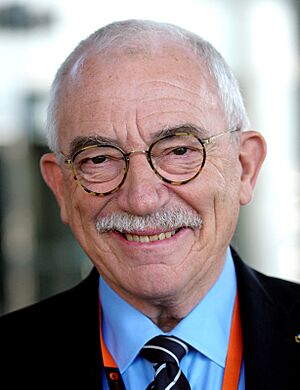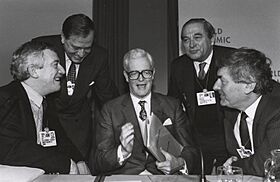Uffe Ellemann-Jensen facts for kids
Uffe Ellemann-Jensen (born November 1, 1941 – died June 18, 2022) was an important Danish politician. He served as Denmark's Minister for Foreign Affairs from 1982 to 1993. He was also the leader of the Danish Liberal Party, Venstre, from 1984 to 1998. Later, he became President of the European Liberals from 1995 to 2000.
In 1998, Ellemann-Jensen started the Baltic Development Forum. This group helps businesses grow in the Baltic Sea area. He was its first chairman until 2011 and then became an honorary chairman. He also served on the boards of several international companies.
Quick facts for kids
Uffe Ellemann-Jensen
|
|
|---|---|
 |
|
| Minister of Foreign Affairs | |
| In office 10 September 1982 – 25 January 1993 |
|
| Prime Minister | Poul Schlüter |
| Preceded by | Kjeld Olesen |
| Succeeded by | Niels Helveg Petersen |
| Leader of Venstre | |
| In office 23 July 1984 – 18 March 1998 |
|
| Preceded by | Henning Christophersen |
| Succeeded by | Anders Fogh Rasmussen |
| President of the European Liberals | |
| In office 1995–2000 |
|
| Preceded by | Willy De Clercq |
| Succeeded by | Werner Hoyer |
| Personal details | |
| Born | 1 November 1941 Haarby, Denmark |
| Died | 18 June 2022 (aged 80) Copenhagen, Denmark |
| Political party | Venstre |
| Spouses |
Hanne Jonsen
(m. 1963–1971)Alice Vestergaard
(m. 1971) |
| Children | 4 incl.:
|
Contents
Political Career and Achievements
Uffe Ellemann-Jensen strongly supported NATO and the European Union. He believed these groups helped Western countries work together. This belief often led to disagreements with other political parties in Denmark.
He successfully convinced the Danish Parliament, called the Folketinget, to support the United States during the Gulf War. In 1991, Denmark was the first country to officially recognize the independence of the three Baltic countries (Estonia, Latvia, and Lithuania).
In 1992, Ellemann-Jensen worked with his German colleague, Hans-Dietrich Genscher. Together, they helped create the Council of the Baltic Sea States (CBSS) and the EuroFaculty. These organizations aimed to strengthen cooperation in the Baltic Sea region.
In September 1992, Ellemann-Jensen visited southern Somalia. This was one of the first visits by foreign officials since the civil war began there.
After his government lost power in 1993, Ellemann-Jensen became the leader of the opposition. He remained in this role until the 1998 election. He narrowly lost this election, missing the chance to become Prime Minister by a very small number of votes. After this, he decided to leave politics. Anders Fogh Rasmussen took over as the leader of his party, Venstre.
Ellemann-Jensen's active approach to foreign policy continued even after he left his role as Foreign Minister. This new way of handling international relations became known as the Ellemann-Jensen doctrine.
In 1995, he was considered for the job of Secretary-General of NATO. The U.S. supported him, but France preferred another candidate, Javier Solana. Ellemann-Jensen was disappointed not to get this position, which he had wanted for a long time.
After leaving politics, he wrote columns for the Danish newspaper Berlingske Tidende. He also contributed to Project Syndicate, an organization that publishes articles from experts worldwide.
In 2005, a Danish newspaper printed some cartoons that caused a lot of discussion. Ellemann-Jensen wrote that he thought the cartoons were an "unnecessary provocation." However, he also supported the Danish Prime Minister's view that the government should not punish the newspaper. He believed in the importance of freedom of expression.
Personal Life
Uffe Ellemann-Jensen was the son of Jens Peter Jensen, who was also a member of the Danish Parliament. In 1971, he married Alice Vestergaard. He had four children, including Jakob Ellemann-Jensen and Karen Ellemann, who are also politicians. He enjoyed hunting and fishing.
Awards and Recognition
On December 18, 2002, Ellemann-Jensen received the Grand Cross of the Order of Dannebrog. This is a very high honor in Denmark.
On February 12, 2010, he received the Order 8-September from the Republic of Macedonia. This award recognized his efforts to strengthen relations between Denmark and Macedonia. It also honored his support for Macedonia when it first became independent in the early 1990s.
Health and Later Years
Uffe Ellemann-Jensen faced several health challenges throughout his life. In 1989, he had surgery on his neck, which led to him wearing a neck brace for a while. He also had heart issues, including a stent and a pacemaker. In 2003, he had a blood clot, which led him to stop smoking. He also had diabetes. In 2019, he had a tumor removed that was pressing on his spinal cord. He often spoke about how medical science helped him live with these conditions.
In August 2021, he was hospitalized with COVID-19 for several weeks, even though he was vaccinated. He had successful surgery for prostate cancer in 2011. However, the cancer returned later. On June 13, 2022, he was admitted to the hospital and passed away on June 18, 2022, at the age of 80.
 | Bessie Coleman |
 | Spann Watson |
 | Jill E. Brown |
 | Sherman W. White |


